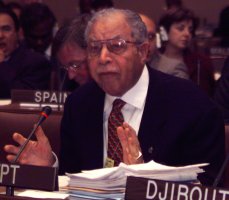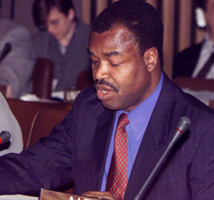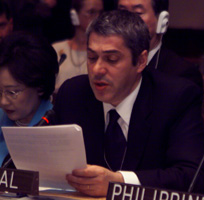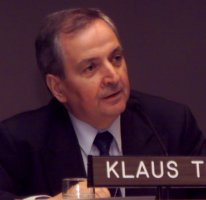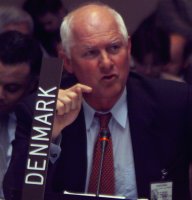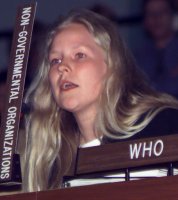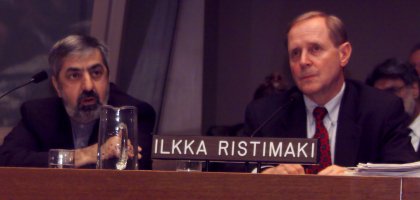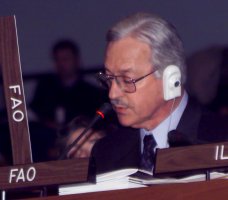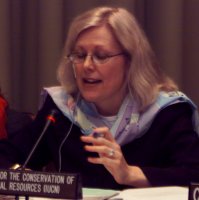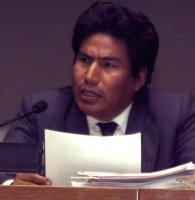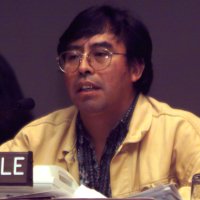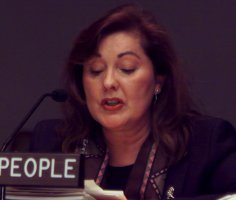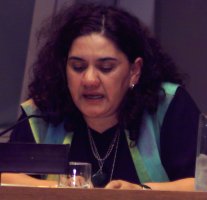| |
|
|
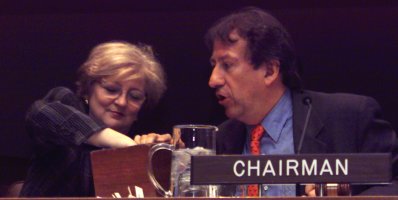 Louise Fréchette (Canada), UN Deputy Secretary-General
picks country names to determine the order of speakers
for the high-level segment
Louise Fréchette (Canada), UN Deputy Secretary-General
picks country names to determine the order of speakers
for the high-level segment
|
High-Level Segment with a thematic focus on
land and agriculture
|
|
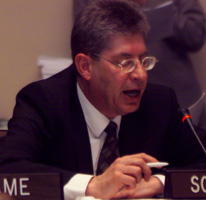
|
 Dirk C duToit,
Deputy Minister for Agriculture and Land Affairs (South Africa)
stressed the importance of delivering basic services/goods to the
disadvantaged, redistribute and empower, foremost in
agriculture. "We must actualize the solidarity of
mankind". duToit later suggested that South Africa be
the venue for the 2002 Rio+10 Earth Summit.
Dirk C duToit,
Deputy Minister for Agriculture and Land Affairs (South Africa)
stressed the importance of delivering basic services/goods to the
disadvantaged, redistribute and empower, foremost in
agriculture. "We must actualize the solidarity of
mankind". duToit later suggested that South Africa be
the venue for the 2002 Rio+10 Earth Summit.
|
|
Nigeria, speaking for the
G-77/China
|
|
|
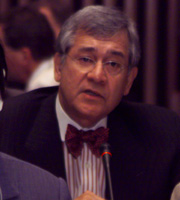
|
Samoa
|
| High-Level Segment on Preparations for the 2002
Review of progress since UNCED |
|
 Nitin Desai, Under-Secretary General for Economic and Social Affairs
(left) noted that focus should be on implementation of commitments
made in the 1992 Rio de Janiero Earth Summit. Within the CSD
itself, many work processes lay solid ground for the 2002 Rio+10
meeting such as the successful multi-stakeholder dialogues.
Drawing upon this and other successes, Desai urged delegates to
compile a list of sustainable development success stories in order
to recognize things that have been accomplished in the interceding
years.
Nitin Desai, Under-Secretary General for Economic and Social Affairs
(left) noted that focus should be on implementation of commitments
made in the 1992 Rio de Janiero Earth Summit. Within the CSD
itself, many work processes lay solid ground for the 2002 Rio+10
meeting such as the successful multi-stakeholder dialogues.
Drawing upon this and other successes, Desai urged delegates to
compile a list of sustainable development success stories in order
to recognize things that have been accomplished in the interceding
years.
|
|
|
 UNEP Executive
Director Klaus
Topfer signaled the importance of addressing and overcoming
poverty in a way that doesn't burden future generations and does not
compromise the environment. Questions were also raised about
environmental security, liability, and preparations for the 2002
earth summit (Rio+10).
UNEP Executive
Director Klaus
Topfer signaled the importance of addressing and overcoming
poverty in a way that doesn't burden future generations and does not
compromise the environment. Questions were also raised about
environmental security, liability, and preparations for the 2002
earth summit (Rio+10). |
 Yolanda
Kakabadse, President, IUCN, and former Minister of
Environment (Ecuador) advised that the focus should be on the
process from now until 2002 instead of the Rio+10 event itself,
and the development of measurable indicators. With UNEP
concentrating on elevating the organization to the status of an
environmental regulatory body, Kakabadse questioned whether
existing environmental institutions would be able to deal with
sustainable development in addition to their environmental
responsibilities.
Yolanda
Kakabadse, President, IUCN, and former Minister of
Environment (Ecuador) advised that the focus should be on the
process from now until 2002 instead of the Rio+10 event itself,
and the development of measurable indicators. With UNEP
concentrating on elevating the organization to the status of an
environmental regulatory body, Kakabadse questioned whether
existing environmental institutions would be able to deal with
sustainable development in addition to their environmental
responsibilities. |
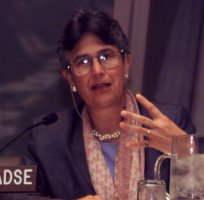 |
 David
Andersen, Minister for the Environment (Canada) states
that the key to success is inclusiveness, and that the proposed
meeting should cover all sectoral issues raised in Agenda 21.
Further to the discussion on the 2002 meeting,
Andersen suggested that outputs of the meeting shift away from the
production of a declaration document or result in high level
policy statements.
David
Andersen, Minister for the Environment (Canada) states
that the key to success is inclusiveness, and that the proposed
meeting should cover all sectoral issues raised in Agenda 21.
Further to the discussion on the 2002 meeting,
Andersen suggested that outputs of the meeting shift away from the
production of a declaration document or result in high level
policy statements.
|
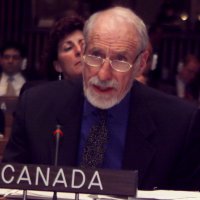 |
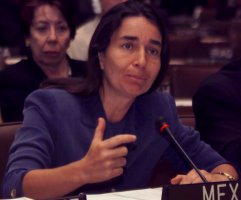 |
Julia
Carabias, Minister of the Environment (Mexico) underscored the
need for indicators of sustainable development progress, and
mechanisms for positive synergy between instruments such as the
Kyoto Protocol, the Cartagena Protocol, and the Framework Convention
on Climate Change. |
 Jurgen Tritten, Minister for the Environment,
Nature Protection and Nuclear Safety (Germany) noted that CSD
faced a lack of implementation. Trittens suggested that the process to the 2002
summit should pay attention to the issue of poverty and introduced
the need for a sustainable framework for globalization.
Germany also supported South Africa's bid to host the 2002
summit.
Jurgen Tritten, Minister for the Environment,
Nature Protection and Nuclear Safety (Germany) noted that CSD
faced a lack of implementation. Trittens suggested that the process to the 2002
summit should pay attention to the issue of poverty and introduced
the need for a sustainable framework for globalization.
Germany also supported South Africa's bid to host the 2002
summit.
|
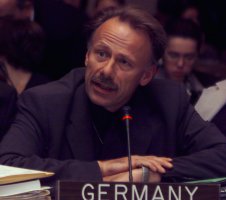 |
|
|
Svend
Auken,
Minister for the Environment (Denmark) |
Franz Fischler, European Commission for Agriculture, Rural Development
and Fisheries
|
|
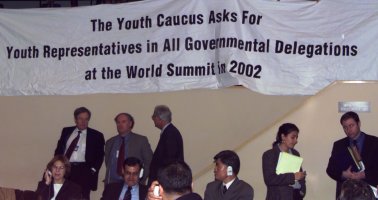 |
|
 Kirsten
Kuipers (above right) of the Dutch National Youth Council for Environment
& Development spoke on behalf of the CSD Youth Caucus.
Suggestions put forth by the Youth Caucus included securing the presence
of a youth representative on all national delegations at the 2002
Rio+10 earth summit, the establishment of fund to finance participation of
youth from the south at Rio+10, and the facilitation of youth plenary meetings
leading up to the 2002 summit. The Youth Caucus stated an interest
in presenting a review of the last 10 years of the CSD from a youth
perspective. They also advocated establishing links
with other NGOs, and encouraging the presence of youth at other major
international fora.
Kirsten
Kuipers (above right) of the Dutch National Youth Council for Environment
& Development spoke on behalf of the CSD Youth Caucus.
Suggestions put forth by the Youth Caucus included securing the presence
of a youth representative on all national delegations at the 2002
Rio+10 earth summit, the establishment of fund to finance participation of
youth from the south at Rio+10, and the facilitation of youth plenary meetings
leading up to the 2002 summit. The Youth Caucus stated an interest
in presenting a review of the last 10 years of the CSD from a youth
perspective. They also advocated establishing links
with other NGOs, and encouraging the presence of youth at other major
international fora.
 CSD-8 Chair Juan
Mayr
summarized
the discussion and noted consensus on a number of suggestions for
the Rio+10 summit in 2002:
CSD-8 Chair Juan
Mayr
summarized
the discussion and noted consensus on a number of suggestions for
the Rio+10 summit in 2002:
- it should
be a high-level summit
- it should
take place in a developing country
- it should
include a broad participatory process
- it should
cover national, regional, and global issues
- it should
not re-negotiate Agenda 21
- it should
include a review process of Agenda 21 implementation (perhaps
undertaken during the preparatory process over the next 2 years)
- it should
include issues such as energy, poverty, globalization,
financing, security, etc.
- the
preparatory process should begin as soon as possible
Mayr also
asked the question of what kind of preparatory body should be
established, if a new challenge should be introduced, if a new
commitment to sustainable development should be made, and how this
event is going to be financed.
|
| High-Level Segment on the outcome of the Intergovernmental
Forum on Forests |
|
IFF
Co-Chairs Bagher Asadi (Iran) and Ilkka Ristimaki (Finland)
|
 Brent
St. Denis, Parliamentary Secretary to Ralph Goodale, Minister
of Natural Resources (Canada) assured that Canada is
proud of itself and its accomplishments in foresty and sustainable
development indicators. It fully supports the IFF proposals
and looks forward to prompt implementation of the UNFF for early
reporting at national, regional and global levels. Brent
St. Denis, Parliamentary Secretary to Ralph Goodale, Minister
of Natural Resources (Canada) assured that Canada is
proud of itself and its accomplishments in foresty and sustainable
development indicators. It fully supports the IFF proposals
and looks forward to prompt implementation of the UNFF for early
reporting at national, regional and global levels.
|
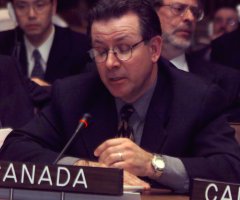 |
 FAO
(above) stated that it has been one of the strongest supporters of
the IFF process, offering its best expertise, but admittedly has
been disappointed in this 5-year process. It has been
pleased with the implementation of National Forestry Programs, and
the ITFF. The FAO made two suggestions : (i) implementation
of, and financial mobilizing for proposals for action needs
concrete results; and (ii) a clear and strong link needs to be
built between this new organization and the FAO.
FAO
(above) stated that it has been one of the strongest supporters of
the IFF process, offering its best expertise, but admittedly has
been disappointed in this 5-year process. It has been
pleased with the implementation of National Forestry Programs, and
the ITFF. The FAO made two suggestions : (i) implementation
of, and financial mobilizing for proposals for action needs
concrete results; and (ii) a clear and strong link needs to be
built between this new organization and the FAO.
|
|
 Carole
Saint-Laurent spoke on behalf of IUCN (below) and
noted that the UNFF proposal needed clarification on purpose and
other key issues. Recommendations included ensuring
participatory methods, providing assessment and progress reports,
and developing operational focus issues. IUCN intends to
cooperate with their members and partners to examine these points,
offer assistance to achieve best results.
Carole
Saint-Laurent spoke on behalf of IUCN (below) and
noted that the UNFF proposal needed clarification on purpose and
other key issues. Recommendations included ensuring
participatory methods, providing assessment and progress reports,
and developing operational focus issues. IUCN intends to
cooperate with their members and partners to examine these points,
offer assistance to achieve best results.
|
Day of Indigenous People at CSD-8: Panel on Trade
and Indigenous People |

 ENB
Summary of Ad Hoc Open-Ended Intergovernmental Group of Experts on Energy
and Sustainable Development ENB
Summary of Ad Hoc Open-Ended Intergovernmental Group of Experts on Energy
and Sustainable Development
 CSD-8
Intersessionals CSD-8
Intersessionals
 Linkages
CSD page Linkages
CSD page
 UN
- CSD website with official
documents UN
- CSD website with official
documents
 ENB's
"Introduction to CSD" ENB's
"Introduction to CSD"

|


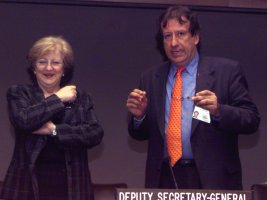
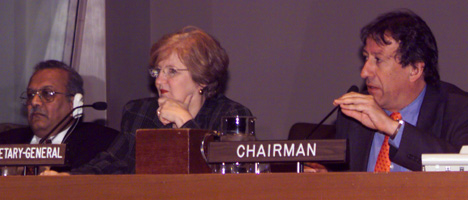
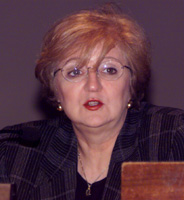
 Louise Fréchette (Canada), UN Deputy Secretary-General
picks country names to determine the order of speakers
for the high-level segment
Louise Fréchette (Canada), UN Deputy Secretary-General
picks country names to determine the order of speakers
for the high-level segment